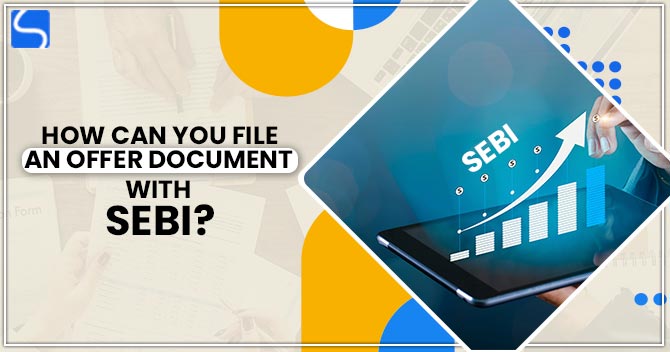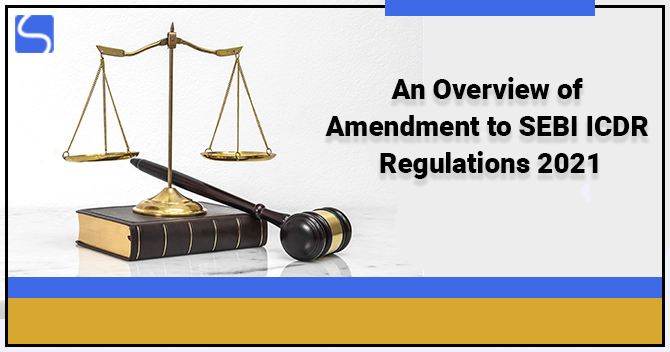How Can You File An Offer Document with SEBI?

Karan Singh | Updated: Aug 30, 2021 | Category: SEBI Advisory
An Offer Document is a document that includes all the pertinent company details, initiatives, financial information, problem types, promoters, etc., and it is used by the issuer to invite subscriptions to the issue and to help an investor to make their investment decision. In the matter of a public issue, the Offer Document is called a Prospectus, and in the case of a rights issue; it is called a Letter of Offer. In this blog, we will discuss the Offer Document and the process to file an Offer Document with SEBI.
Table of Contents
An Overview of Draft Document with SEBI
It is the first document submitted for consent by SEBI entities and stock exchanges. After inspection, it communicates its feedback to the Company, which the Company is anticipated to mix into the Offer Document. Processing a drafted Offer Document with SEBI generally requires a time of thirty days or one month. SEBI (Securities and Exchange Board of India) will put the drafted document on their website. It is also put this document on the website of registered stock exchanges where it is planned to list certain securities & to comment in public on the associated merchant bankers with the issue for a period of at least twenty-one days. Further, the issuer should make an announcement in one English national newspaper, one Hindi newspaper, and one regional language newspaper at a place where its registered office is located on the filing date of the drafted offer document with SEBI or the next day, revealing publicly the fact of filing the drafted document and inviting the public to give their statements to SEBI.
Companies seeking to raise up to Rs. 750 crores can now send their drafted document to the SEBI Market Regulator Regional Offices.
In a notification announced by SEBI, it was confirmed that the drafted documents should be filed with the appropriate regional office of the SEBI under the jurisdiction of which the registered office of the issuing Company falls, concerning issues of a size up to Rs. 750 crores. Moreover, the SEBI announced that for all regions, entities might file their drafted documents at the headquarters of SEBI for issuer more than Rs. 750 crores in size.
Process to File an Offer Document with SEBI
To file an Offer Document with SEBI following the steps given below:
- To provide operations in the search for comments on drafted offer paper, drafted agreement schemes, and drafted offer letters pursuant to the SEBI (ICDR) Regulations, 2019, SEBI (LODR) Regulations, 2015, SEBI (Substantial Acquisition of Shares & Takeovers) Regulations, 2011, and SEBI (Buyback of Securities) Regulations, 1998 and the different circulars issued thereunder, SEBI has executed a digital system for filing relating to right issues, public issues & insurance issues, schemes of arrangement, institutional placement programme, buybacks & takeovers.
- All Merchant Bankers who are needed to file an Offer Document with SEBI in compliance with the Regulations’ provisions mentioned above shall file the same online at the SEBI Intermediary Portal at, i.e., https://siportal.sebi.gov.in/.
- Known stock exchanges filing an Offer Document with SEBI under the SEBI (LODR) Regulations, 2015 the drafted arrangement scheme and appropriate documents in physical form shall simultaneously file the same via online Intermediary Portal of SEBI.
To get started on the portal following are the steps that should be followed:
Step 1: Self-registration
Step 2: Check Status
Step 3: Login ID Creation
Step 4: Log in to SEBI Portal
Payment Methods
Applicants can pay the applications, and it is a part of self-registration. For the payment of fees, the following are two different methods of payment.

Offline Mode: Demand Draft (DD)
Online Mode: Debit Card, Internet Banking, IMP.
Submission of Draft & Final Offer Document with SEBI
Following are steps for the submission of draft and final Offer Document with SEBI:
Step 1:
- Offering documents up to Rs. 20 crores shall be sent to the regional office of SEBI by the merchant banker under whose jurisdiction the issuer company is licensed.
- The jurisdiction of the regional offices or headquarters of SEBI shall be in compliance with Schedule XXII.
Step 2:
- The draft document submitted with the Board shall be made public in compliance with Clause 5.6 of Chapter V of the guidelines.
- The Merchant Banker makes available to ten Board ten copies of the document and twenty-five copies of the Stock Exchanges where it is proposed to list the issue.
- The Stock Exchange or Lead Merchant Bankers shall make copies of the draft document available to the public.
- Such a fine fee may be paid by the LMB (Lead Merchant Banker) and the Stock Exchange for supplying a copy of the draft Offer Document.
Step 3:
- According to the format specified in Schedule XXIII, the Lead Merchant Banker shall also submit to Board the draft document on a computer disk.
Step 4:
- Lead Merchant Bankers (LMB) shall apply to the dealing offices of the Board at least 2 copies of the final Offer Document within three days of the Offer Document filing with Stock Exchange or ROCs (Registrar of Companies).
- LMB shall, within three days filling the document with Stock Exchange or ROCs, send one copy of the final document to the Primary Market Department, SEBI, Head Office.
- The LMB send the document to the Primary Market Department, SEBI Head Office within three days of filing the final letter of offer with the ROCs or Stock Exchange concerned, a computer disk containing the final prospectus or letter of offer as described in Schedule XXIII. The lead manager will send to SEBI along with the disk an undertaking certifying that the disk content is in the format of HTML and are identical as the case may be, to the printed version of the letter of offer filed with Stock Exchange or ROCs along with the disk.
Step 5:
- Whenever offer documents are filed with any office or department of the Board, the following information “certified to be correct” shall be issued by the LMB in the forwarding letters:
- Date of registration or renewal registration;
- Registration Number;
- Expiration date of registration;
- If submitted for renewal, submission date;
- Any correspondence by the Board that prevents the actions of a LMB;
- Any inquiry that the Board conducts;
- Time of registration fee payment or renewal fees payment;
- Whether any group, promoter, director or associate of the issuer company is associated and incorporated with SEBI. If SEBI registers one/more of these individuals or companies, their respective registration numbers. Reasons for non-renewal if registration has expired. SEBI conducts every inquiry’s details at any time. The penalty charged by SEBI (penalty comprises warning letter, suspension or cancellation or prohibition orders) unpaid payments, if any, payable by such companies to SEBI.
Step 6:
- The Offer Documents which are not followed by the information mentioned in Clause 16.1.5 may be refused.
Step 7:
- Equivalent detail shall be collected from other mediators by LMBs to make sure that they comply with these necessities and are entitled to associate with the issue concerned.
- In their letters, the mediators often suggest that they have received definite knowledge from other mediators.
Conclusion
In the end, SEBI (ICDR) Regulations, 2018 require each issuer to file a draft Offer Document with SEBI through a Merchant Banker, being an unlisted entity willing to make an initial public offer and a listed entity ready to make a right issue for a value more than Rs. 10 crores or a public offer. On behalf of the issuer, the Merchant Bank corresponds to SEBI. Concerning Regulations, within thirty days, SEBI can submit comments on a draft Offer Document filed with it.
Read our article:Blockchain Technology for Depositories – SEBI’s New Guidelines














